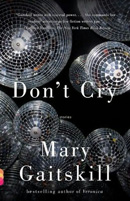
A recurrent comment about Mary Gaitskill's work is that she writes like a man. Powerful, relentless, and at times brutal, her stories take readers to an edge over which female writers apparently are not supposed to step. Gaitskill not only stands us on the precipice for awhile to ponder the view but inevitably pushes us over. In Don't Cry, she is ruthless in cutting to the core of her characters' pain and exposing their innermost secrets; she can be blunt to the point of crudity, and she depicts violence in a manner that brings it as close as a hand-held camera. Yet we're drawn in not so much by an attraction to the grotesque as by a sense of wonderment: the world as it is, and as it is so perceptively rendered in Gaitskill's stories, brims with Yeats's "terrible beauty". A sudden, striking image; an unforeseen connection; a surprising insight; and, most of all, astonishing yet recognizable moments of humanity—these catch us unawares and take our breath away, sometimes like a knife in the belly, sometimes like a kiss in the dark.
The characters in Don't Cry bring a variety of experiences to the page. Gaitskill often relies on her own background: "College Town 1980" takes place in recognizable Ann Arbor, Michigan locations (student co-ops, a seedy café); "The Little Boy" steers Bea Davis through the flashing multicolored lights of the corridors of Detroit's Metroplitan Airport, but her memories take us into "up north" farm country and the sterile suburbs. Characters include creative writing professors and students, well-known authors, and a free-lance journalist covering a book expo. But Gaitskill also steps out of her comfort zone, moving from San Francisco to Ethiopia and introducing a cast of diverse characters, men and women who are young, aging, married, single, gay, straight, rich, poor, reasonable, delusional, moral, and amoral. If one common trait binds them together, it is a sense of brokenness, a feeling that life should have dealt them a better hand, or that they should have played better the one that they were given. But in each man's and woman's story, Gaitskill reveals a microscopic spark flickering within, as if to affirm that where there is pain, there is still life, and who knows what's yet to come?
Different stories in the collection will appeal to different readers. I sped through "Mirror Ball," a fantasy in which part of a girl's soul is taken by a musician with whom she has a one-night stand. I found it hard to engage with the lesbian lovers in "Today I'm Yours"—not because of their sexuality, but because neither seems to have a single redeeming quality. In "The Agonized Face," Gaitskill questions the limits of feminism in a world where prostitution is considered a form of sexual freedom and rape the acceptable collateral damage of war.
In the collection's most daring story, "The Arms and Legs of the Lake," Gaitskill shifts the narration among the passengers on a train, focusing particularly on Jim, a drunk and mentally unbalanced soldier who has just returned from Iraq. Masterfully, she interweaves their thoughts with events and conversation on the train, creating a pitch-perfect yet tragic symphony of human suffering, empathy, and misperception. And through these characters, she makes a powerful statement on the Iraqi war:
Dolores, the main character in "College Town 1980," is similarly broken: she has spent time in a mental hospital and now ties a scarf awkwardly around her head to hide the patches where she has torn out her hair. Gaitskill ends her story with a devastating verbal blow:
The most moving stories involve children; through them, the characters reach epiphanies. In "The Little Boy," a brief connection with a stranger's child stirs memories that enable Bea to understand her daughters and the ex-husband whose funeral she has just attended. In the title story (the last in the collection) a widow helps a friend through a harrowing adoption in war-torn Ethiopia and gains new insight into what it means to be alive.
In the best of its stories, Don't Cry is absolutely stunning. This is one of those rare books that
left me emotionally moved and somehow changed, and I will be thinking about its impact for months to come.

Vintage, paperback, 9780307275875
